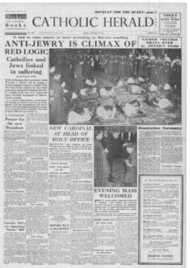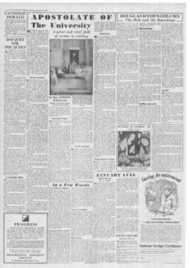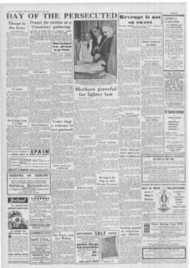Page 3, 23rd January 1953
Page 3

Report an error
Noticed an error on this page?If you've noticed an error in this article please click here to report it.
Tags
Share
Related articles
Coronation Ritual And A Basic Truth
Henry Iv's Crown At Liverpool
Liturgy And The Temporal Order
The New Pope
Pope's Representative At The Coronation
Argument Over Coronation
THE CORONATION SERVICE, by Francis C. Eeles (Mowbray, 7s. 6d.).
HE long history of the Catholic rites used in the coronations of Christian emperors and kings is fascinating to study, not least because SO much of it is controversial.
The controversy centres in the main on the question of whether these rites were intended to set the Sovereign apart as a person half-way between a priest and a layman. In other words, what precise significance was to be attached to the "consecration" and "anointing" which forms part of the rite? St. Augustine traced it from the Jewish anointing which he held to confer a specific grace on the recipient, and St. Gregory spoke of it as a kind of sacramental.
The very close resemblance between the full coronation ceremony in France and England and the consecration of a Bishop, as well as the close parallelism between the robes blessed and worn, strongly suggested some such ecclesiastical intentions.
A BLESSING
However, there are very strong arguments for the view that the coronation was an ecclesiastical blessing rather than a true consecration, and that the parallelism in ceremonial is a mere survival of days when external distinctions of this kind had less meaning than they would have had later. But it is certainly strange that the coronation ceremonial, varied as it is in its origins, should have retained through the centuries detailed characteristics almost unchanged from the early Middle Ages.
In fact, what will take place in Westminster Abbey in June is virtually the very same external ceremony which was evolved in England and France before the year 1000, and this despite the change of religion in Britain.
unpleasant reference to the Catholic Church in this book written presumably under Anglican auspices.
On the very first page, he writes: "In 1685 there were some unfortunate alterations caused by James II being a Roman Catholic and refusing to receive Holy Communion in the Chinch of England." Why "unfortunate," when James II was maintaining the tradition that would have tbeioenn? unbroken but for the Reforma Later he writes again of James H as a "Romanist," and the "mischief" caused on his behalf. And all this despite his purpose of showing the unaltered continuity of the coronation from Catholic days. On this thesis, the changes made necessary by James's religion were far more significant of the whole breach in continuity than could be said of the external resemblances on which the author sets such religious store.
AN ACCIDENT
On the controverted question of the Oath to 'maintain in the United Kingdom the Protestant Reformed Religion established by Law," Mr. Eeles points out, we think rightly, that the coronation service, in its use of the Nicene Creed and specific prayers, can only be regarded as intending to express and maintain the "Catholic Faith" in England, and that the reference to Protestantism is an accident that does not fit the ceremony itself. Rut Mr. Eeles's remarks about the Oath and the Declaration (e.g., on page 30) are so confused and badly expressed as to be unintel This popular book may be of some service to people who know little or nothing about the religious aspects of the coronation, but it betrays little serious knowledge on the part of the writer of the complex history of a great Catholic tradition.
THE GOOD CONFESSOR, by Fe. Gerald Kelly, S.J. (Clonniore & Reynolds, 5s.).
THIS is for young priests. It is not 1 moral theology but a booklet of severely practical advice on how moral theological precepts are to be applied in practice.
It is the fruit of experience and the distilling of the wisdom of Fr. Francis O'Boyle, SI, who for more than 30 years was Professor of Moral Theology, teaching most of the Jesuits of the American Middle West and many of the South. It was published last year in the U.S. and had an immediate and deserved success.
CANDLELIGHT AMC and ODD JOBS, by Cicely Hallack (Bums Oates, 7s, 6d.) THIS reprint, combining two books by Cicely Hallack, should find as sure a new public as it will certainly find a waiting one.
I should have preferred for the sake of new readers that the second set of stories had come first; they are more generally representative of her style and craft. The seven "true stories of the supernatural" leave so many questions unanswered; I like fiction fictional, and true stories documented.
blog comments powered by Disqus







